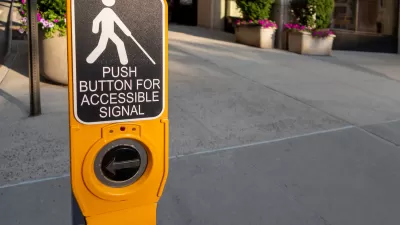Economist Joe Cortright doesn't seem to think so. According to his findings, Americans are driving less, with Millennials leading the way, and this unprecedented trend is here to stay.
Though Americans have been driving less since 2005, predating the Great Recession, "the question of whether the decline in driving marked a sea change in the way we get around or simply reflected a drop in economic activity has been a matter of considerable debate," reports Stephen Miller.
According to findings presented recently by Cortright, that question may now be settled. When charting federal data on vehicles miles traveled (VMT) before and after the last 5 recessions, Cortright finds that the patterns following the most recent recession were exceptional. "In four of the five recessions, driving was either increasing or stagnant in the two years before the economic slowdown, and it quickly picked up steam during the recovery," reports Miller. "The only exception was the most recent recession, which lasted from December 2007 to June 2009. Before the recession, driving per person was dropping. After the recession, driving continued to fall."
Cortright's findings indicate that, "economic and cultural changes are leading to less driving."
"Many people who might otherwise live in the suburbs are choosing instead to live in places where they can get around by walking, biking, and taking transit," writes Miller. These trends are also corroborated by private data, which shows that "congestion in U.S. metropolitan areas has been dropping as well," adds Miller.
FULL STORY: It’s Not the Economy, Stupid: Americans Really Are Driving Less

Planetizen Federal Action Tracker
A weekly monitor of how Trump’s orders and actions are impacting planners and planning in America.

Restaurant Patios Were a Pandemic Win — Why Were They so Hard to Keep?
Social distancing requirements and changes in travel patterns prompted cities to pilot new uses for street and sidewalk space. Then it got complicated.

Maui's Vacation Rental Debate Turns Ugly
Verbal attacks, misinformation campaigns and fistfights plague a high-stakes debate to convert thousands of vacation rentals into long-term housing.

In California Battle of Housing vs. Environment, Housing Just Won
A new state law significantly limits the power of CEQA, an environmental review law that served as a powerful tool for blocking new development.

Boulder Eliminates Parking Minimums Citywide
Officials estimate the cost of building a single underground parking space at up to $100,000.

Orange County, Florida Adopts Largest US “Sprawl Repair” Code
The ‘Orange Code’ seeks to rectify decades of sprawl-inducing, car-oriented development.
Urban Design for Planners 1: Software Tools
This six-course series explores essential urban design concepts using open source software and equips planners with the tools they need to participate fully in the urban design process.
Planning for Universal Design
Learn the tools for implementing Universal Design in planning regulations.
Heyer Gruel & Associates PA
JM Goldson LLC
Custer County Colorado
City of Camden Redevelopment Agency
City of Astoria
Transportation Research & Education Center (TREC) at Portland State University
Camden Redevelopment Agency
City of Claremont
Municipality of Princeton (NJ)





























